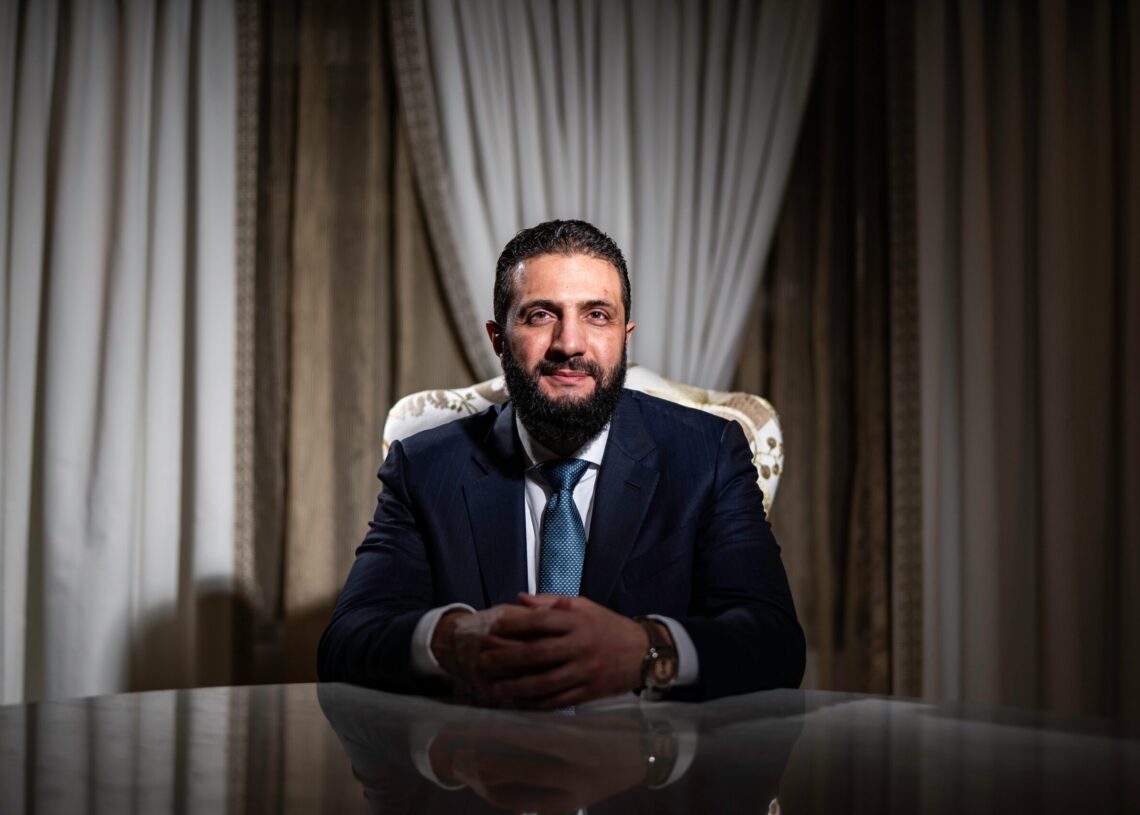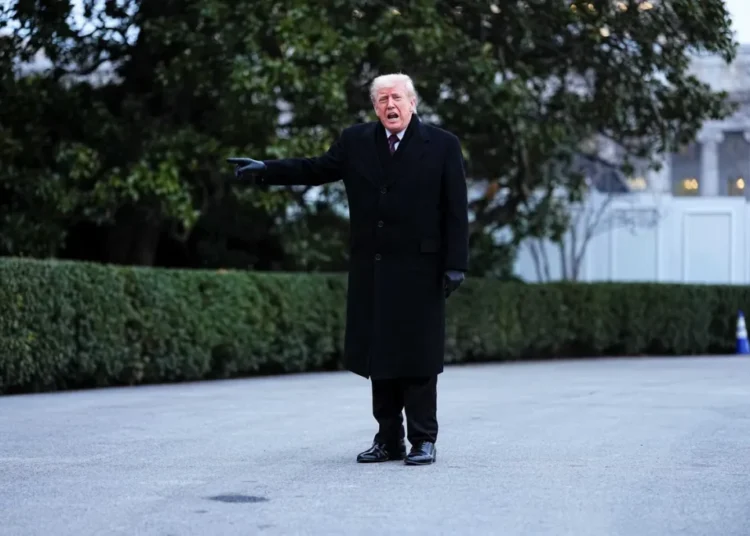After a historic first trip to the White House, Syrian President Ahmed al-Sharaa sat down Monday for an interview with The Washington Post. In an hour-long conversation, the onetime militant, who spoke through an interpreter, discussed the importance of rebuilding Syria’s relationship with the United States. He also offered frank assessments of ongoing talks with Israel, postwar sectarian violence and his own improbable journey from Iraq-based insurgent and rebel leader in Syria to the first Syrian head of state to meet a U.S. president in Washington.
After a historic first trip to the White House, Syrian President Ahmed al-Sharaa sat down Monday for an interview with The Washington Post. In an hour-long conversation, the onetime militant, who spoke through an interpreter, discussed the importance of rebuilding Syria’s relationship with the United States. He also offered frank assessments of ongoing talks with Israel, postwar sectarian violence and his own improbable journey from Iraq-based insurgent and rebel leader in Syria to the first Syrian head of state to meet a U.S. president in Washington.
This interview has been edited for length and clarity.
You met today with President Donald Trump and with members of Congress. I wonder if you could talk to us about what your objectives were for the trip and whether you come away from it having met them?
The most important objective is starting on — building the relationship between Syria [and the] United States, because in the past 100 years, it wasn’t a very good relationship.
We were looking for common interest between the United States and Syria, and we found that we have a lot of common interests that we can build on, [such as] security interests and economic interests. The stability of Syria will impact the entire region, and the instability of Syria, as well, will impact the region.
Stability is linked with the economy, and the economy, or economic development, is linked with the lifting of sanctions. This discussion has been going on for months now, and I believe that we reached good results. But we are still waiting for the final decision.
Our colleague Austin Tice disappeared in Syria. I’m wondering if you could tell us what you know about the search for him and his whereabouts, and if you’ve been communicating about him with the White House and others in Washington?
During the war that the former regime waged against the Syrian people, we have around 250,000 missing people — missing Syrians. This number includes some people who have other nationalities, such as Austin Tice.
We managed to release an American citizen from the prisons when we got to Damascus and immediately handed him over to American authorities. We established a commission for missing persons; there is a focus on the people who have American citizenship and went missing in Syria, and we are coordinating with the American authorities.
I met with some of the families of the missing people, including the mother of Austin Tice. She’s a great woman. And I also had her meet with my mother, because my mother had a similar story. I went missing for seven years, and everyone thought that I was killed except my mother. She had strong belief that I would come back one day.
What would you say to an average American who talks to their Congress member and is debating these sanctions, and says, “Why are we lifting sanctions on a man who was a fighter against the United States?”
To start with, fighting is not something shameful if it’s done for noble objectives, especially if you are defending your own land and the people who are suffering from injustice. I believe this is something good that people should be commended for. I have fought so many wars, but I’ve never caused the death of an innocent person.
And when somebody engages in fighting, they should have a very strong ethical background. The region was affected by the policies — Western policies and U.S. policies — and today, we have so many Americans who agree with us that some of these policies were a mistake and that they caused so many wars that were pointless.
One of the concerns raised by people who don’t want to lift the sanctions is the violence still happening in your country. Under the regime [of former president Bashar al-Assad], there was an effort to pit various groups against each other, but some of those groups are still fighting. How would you respond to critics who say you haven’t done enough to lower that type of violence, and what is your plan to make sure attacks on minorities do not continue?
Syria just got out of a fierce war, and it was living under dictatorship and the harsh regime that controlled the country for 60 years. We are going through a transitional period right now, and in transition, there are situations, conditions and laws that are different from stable countries.
For example, the Civil War in the United States — after it finished, were things stable after one year? Or did it take so long, so many years after the war? We are in the stage of rebuilding the state, and restoring and rebuilding the law. But I’m not saying that there are no problems in Syria. It’s not the end of the story.
There are individual interests of certain groups that want to have independence or autonomy. Some of those parties, they want to find justification for their interests, so they use their denomination or their faith as an umbrella.
They talk about an existential threat for their denomination or faith. In Syria, we have been living in coexistence with different groups, different religious groups, for 1,400 years. We’re still existing, and we still have that diversity.
You’ve still got the Islamic State in the eastern part of the country. The Americans say that their reason for being there is to fight the Islamic State. Could you talk to us about what the status is of your agreement with the Syrian Democratic Forces, with the Kurdish groups, and whether you think the U.S. and those groups are still needed as a force?
We were in a war with [the Islamic State] for 10 years, and we did that without coordination with a Western force or any other country.
Syria today is capable of shouldering this responsibility. Keeping Syria divided, or having any military force that is not under control of the government, represents the best environment for ISIS to flourish.
I believe the best solution is that the U.S. troops present in Syria should supervise the integration [of the SDF into the central government’s security forces]. The task of protecting Syrian territory will be the responsibility of the state.
Syria has faced repeated attacks by the Israeli military. It also occupies Syrian land and appears to be fomenting sectarianism, particularly within the Druze community. How do you plan on protecting Syrian sovereignty from not just internal forces, but external forces as well?
Syria got into war with Israel 50 years ago. Then, in 1974, there was a disengagement agreement.
This agreement lasted for 50 years. But when the [Assad] regime fell, Israel revoked this agreement. They expanded their presence in Syria, expelled the U.N. [peacekeeping] mission and occupied new territory.
They have conducted over 1,000 airstrikes in Syria since Dec. 8, and that included bombing the Presidential Palace and the Ministry of Defense. But because we want to rebuild Syria, we didn’t respond to these aggressions.
The advances that Israel made into Syria are not coming from [their] security concerns but are coming from their expansionist ambitions.
Israel has always claimed that it has concerns about Syria because it is afraid of the threats that the Iranian militias and [Lebanon’s] Hezbollah represent. We are the ones who expelled those forces out of Syria.
We are engaged in direct negotiations with Israel, and we have gone a good distance on the way to reach an agreement. But to reach a final agreement, Israel should withdraw to their pre-Dec. 8 borders.
The United States is with us in these negotiations, and so many international parties support our perspective in this regard. Today, we found that Mr. Trump supports our perspective as well, and he will push as quickly as possible in order to reach a solution for this.
Would Syria agree to demilitarize the region south of Damascus?
To talk about an entire region demilitarized, it will be difficult, because if there is any kind of chaos, who will protect it? If this demilitarized zone was used by some parties as a launching pad for hitting Israel, who is going to be responsible for that?
And at the end of the day, this is Syrian territory, and Syria should have the freedom of dealing with their own territory.
Israel occupied the Golan Heights in order to protect Israel, and now they are imposing conditions in the south of Syria in order to protect the Golan Heights. So after a few years, maybe they will occupy the center of Syria in order to protect the south of Syria. They will reach Munich on that pathway.
The former Syrian leader is in Moscow being essentially protected by the government of Vladimir Putin. Have you raised this issue with the Russians? Have you asked for him to be returned to face trial for the crimes that he committed?
We were in war against Russia for 10 years, and it was a hard, difficult war. They announced that they killed me several times.
We need Russia because it’s a permanent member of the [U.N.] Security Council. We need their vote to be on our side in some issues, and we have strategic interests with them. We don’t want to push Russia to take alternative or other options in dealing with Syria.
The issue of Bashar al-Assad is troublesome for Russia, and our relationship with them — we’re still in the beginning. We will preserve our rights as Syrians to call for bringing Assad to justice.
The post Syrian president details plans to work with Americans he once fought
appeared first on Washington Post.




